Marketing Essentials - Coca-Cola Marketing Plan and Analysis Report
VerifiedAdded on 2020/11/23
|21
|7197
|233
Report
AI Summary
This report provides a comprehensive analysis of marketing essentials, focusing on the key roles and responsibilities of marketing functions within an organization. It begins with an introduction to marketing, defining its purpose and significance in identifying and satisfying customer needs. The report then delves into the explanation of key marketing concepts, current and future marketing trends, and the specific roles and responsibilities of marketing functions, particularly in the context of Coca-Cola. It further analyzes the roles and responsibilities of marketing within the broader marketing environment, exploring the interrelationship of marketing with other functional departments. The report includes a comparison of how different organizations apply the marketing mix and culminates in the development of a detailed marketing plan specifically tailored for Coca-Cola, aligning with its business objectives. The report also covers market research, brand management, and information systems within the context of the marketing environment, providing a holistic overview of marketing strategies and their practical application.

MARKETING
ESSENTIALS
ESSENTIALS
Paraphrase This Document
Need a fresh take? Get an instant paraphrase of this document with our AI Paraphraser
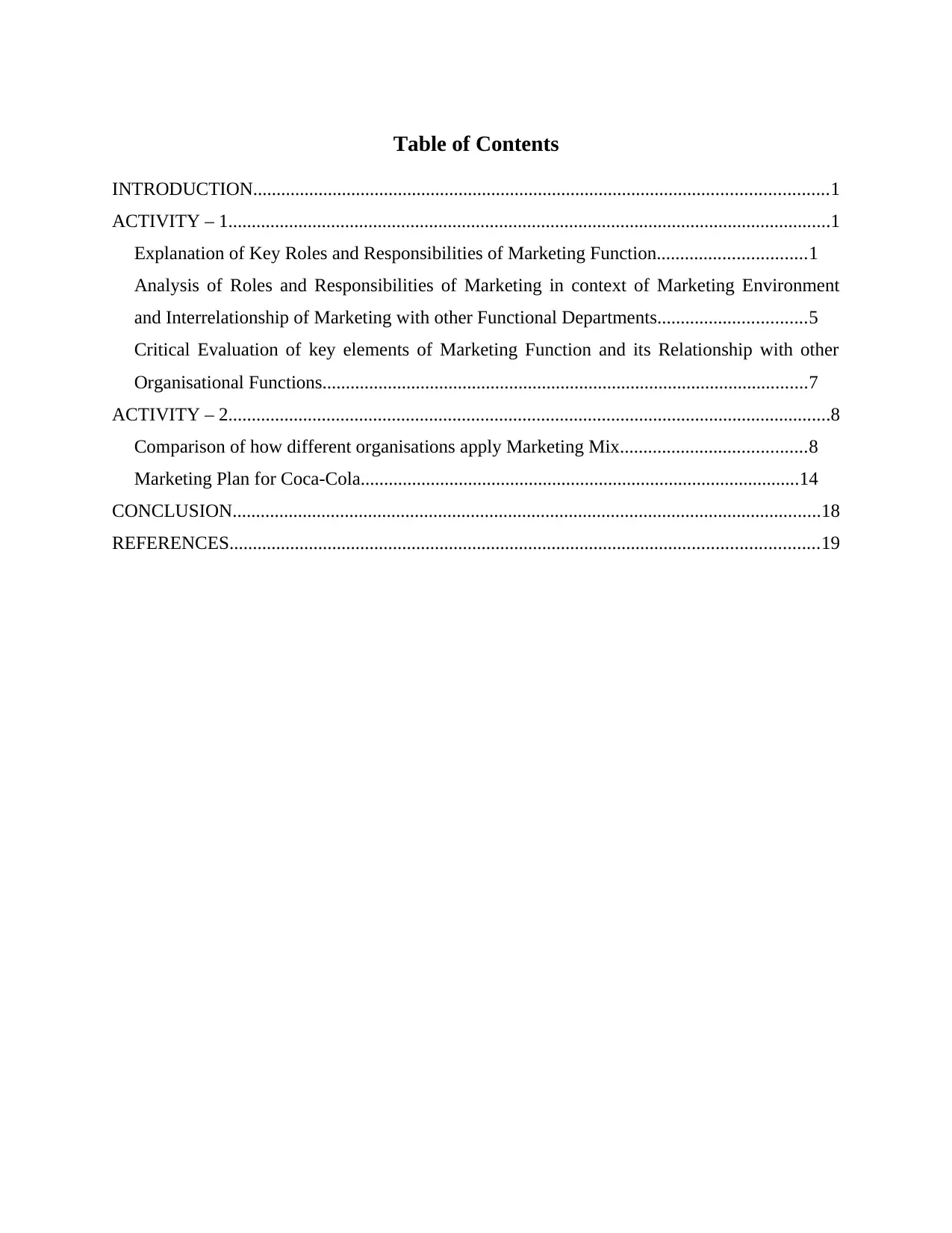
Table of Contents
INTRODUCTION...........................................................................................................................1
ACTIVITY – 1.................................................................................................................................1
Explanation of Key Roles and Responsibilities of Marketing Function................................1
Analysis of Roles and Responsibilities of Marketing in context of Marketing Environment
and Interrelationship of Marketing with other Functional Departments................................5
Critical Evaluation of key elements of Marketing Function and its Relationship with other
Organisational Functions........................................................................................................7
ACTIVITY – 2.................................................................................................................................8
Comparison of how different organisations apply Marketing Mix........................................8
Marketing Plan for Coca-Cola..............................................................................................14
CONCLUSION..............................................................................................................................18
REFERENCES..............................................................................................................................19
INTRODUCTION...........................................................................................................................1
ACTIVITY – 1.................................................................................................................................1
Explanation of Key Roles and Responsibilities of Marketing Function................................1
Analysis of Roles and Responsibilities of Marketing in context of Marketing Environment
and Interrelationship of Marketing with other Functional Departments................................5
Critical Evaluation of key elements of Marketing Function and its Relationship with other
Organisational Functions........................................................................................................7
ACTIVITY – 2.................................................................................................................................8
Comparison of how different organisations apply Marketing Mix........................................8
Marketing Plan for Coca-Cola..............................................................................................14
CONCLUSION..............................................................................................................................18
REFERENCES..............................................................................................................................19
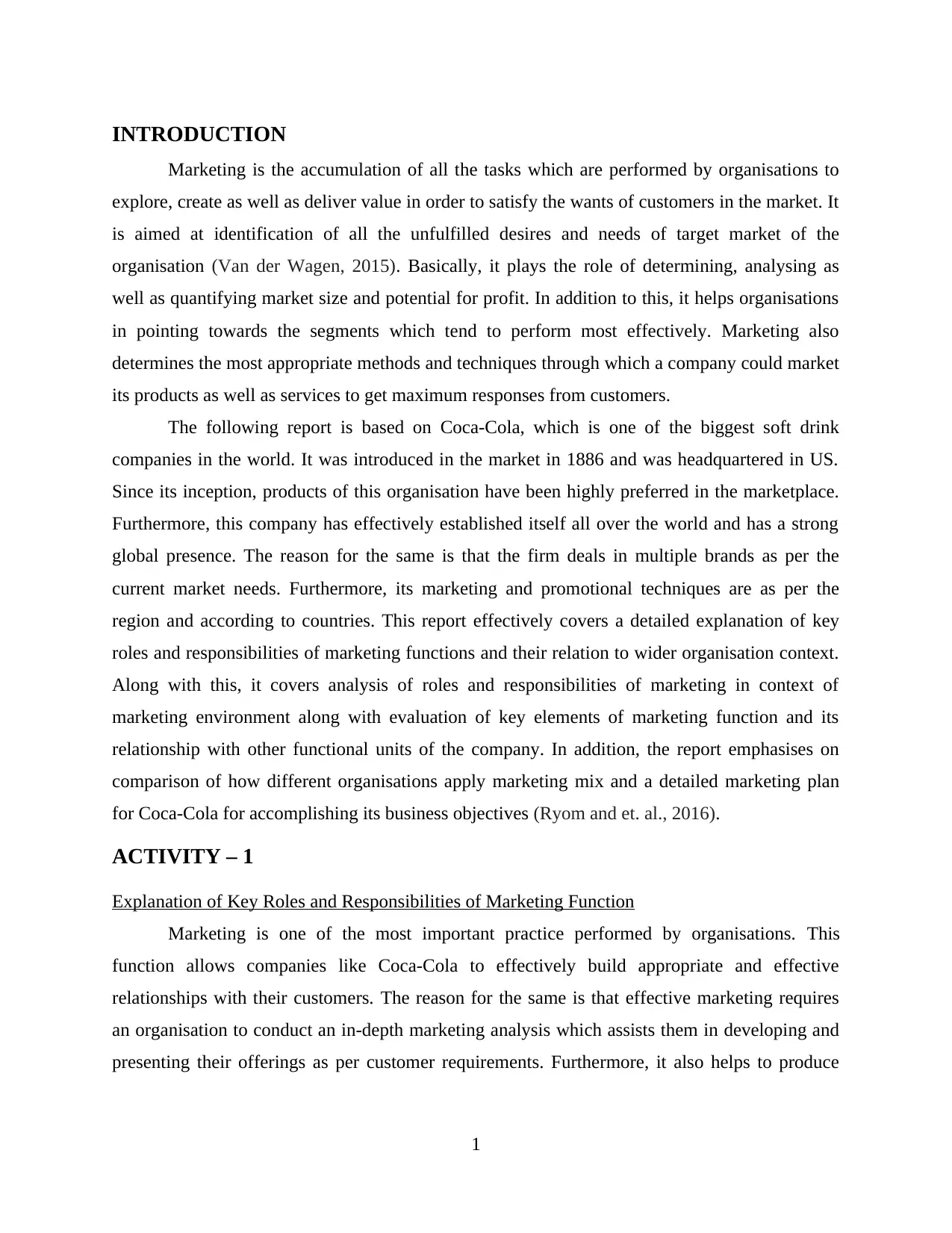
INTRODUCTION
Marketing is the accumulation of all the tasks which are performed by organisations to
explore, create as well as deliver value in order to satisfy the wants of customers in the market. It
is aimed at identification of all the unfulfilled desires and needs of target market of the
organisation (Van der Wagen, 2015). Basically, it plays the role of determining, analysing as
well as quantifying market size and potential for profit. In addition to this, it helps organisations
in pointing towards the segments which tend to perform most effectively. Marketing also
determines the most appropriate methods and techniques through which a company could market
its products as well as services to get maximum responses from customers.
The following report is based on Coca-Cola, which is one of the biggest soft drink
companies in the world. It was introduced in the market in 1886 and was headquartered in US.
Since its inception, products of this organisation have been highly preferred in the marketplace.
Furthermore, this company has effectively established itself all over the world and has a strong
global presence. The reason for the same is that the firm deals in multiple brands as per the
current market needs. Furthermore, its marketing and promotional techniques are as per the
region and according to countries. This report effectively covers a detailed explanation of key
roles and responsibilities of marketing functions and their relation to wider organisation context.
Along with this, it covers analysis of roles and responsibilities of marketing in context of
marketing environment along with evaluation of key elements of marketing function and its
relationship with other functional units of the company. In addition, the report emphasises on
comparison of how different organisations apply marketing mix and a detailed marketing plan
for Coca-Cola for accomplishing its business objectives (Ryom and et. al., 2016).
ACTIVITY – 1
Explanation of Key Roles and Responsibilities of Marketing Function
Marketing is one of the most important practice performed by organisations. This
function allows companies like Coca-Cola to effectively build appropriate and effective
relationships with their customers. The reason for the same is that effective marketing requires
an organisation to conduct an in-depth marketing analysis which assists them in developing and
presenting their offerings as per customer requirements. Furthermore, it also helps to produce
1
Marketing is the accumulation of all the tasks which are performed by organisations to
explore, create as well as deliver value in order to satisfy the wants of customers in the market. It
is aimed at identification of all the unfulfilled desires and needs of target market of the
organisation (Van der Wagen, 2015). Basically, it plays the role of determining, analysing as
well as quantifying market size and potential for profit. In addition to this, it helps organisations
in pointing towards the segments which tend to perform most effectively. Marketing also
determines the most appropriate methods and techniques through which a company could market
its products as well as services to get maximum responses from customers.
The following report is based on Coca-Cola, which is one of the biggest soft drink
companies in the world. It was introduced in the market in 1886 and was headquartered in US.
Since its inception, products of this organisation have been highly preferred in the marketplace.
Furthermore, this company has effectively established itself all over the world and has a strong
global presence. The reason for the same is that the firm deals in multiple brands as per the
current market needs. Furthermore, its marketing and promotional techniques are as per the
region and according to countries. This report effectively covers a detailed explanation of key
roles and responsibilities of marketing functions and their relation to wider organisation context.
Along with this, it covers analysis of roles and responsibilities of marketing in context of
marketing environment along with evaluation of key elements of marketing function and its
relationship with other functional units of the company. In addition, the report emphasises on
comparison of how different organisations apply marketing mix and a detailed marketing plan
for Coca-Cola for accomplishing its business objectives (Ryom and et. al., 2016).
ACTIVITY – 1
Explanation of Key Roles and Responsibilities of Marketing Function
Marketing is one of the most important practice performed by organisations. This
function allows companies like Coca-Cola to effectively build appropriate and effective
relationships with their customers. The reason for the same is that effective marketing requires
an organisation to conduct an in-depth marketing analysis which assists them in developing and
presenting their offerings as per customer requirements. Furthermore, it also helps to produce
1
⊘ This is a preview!⊘
Do you want full access?
Subscribe today to unlock all pages.

Trusted by 1+ million students worldwide
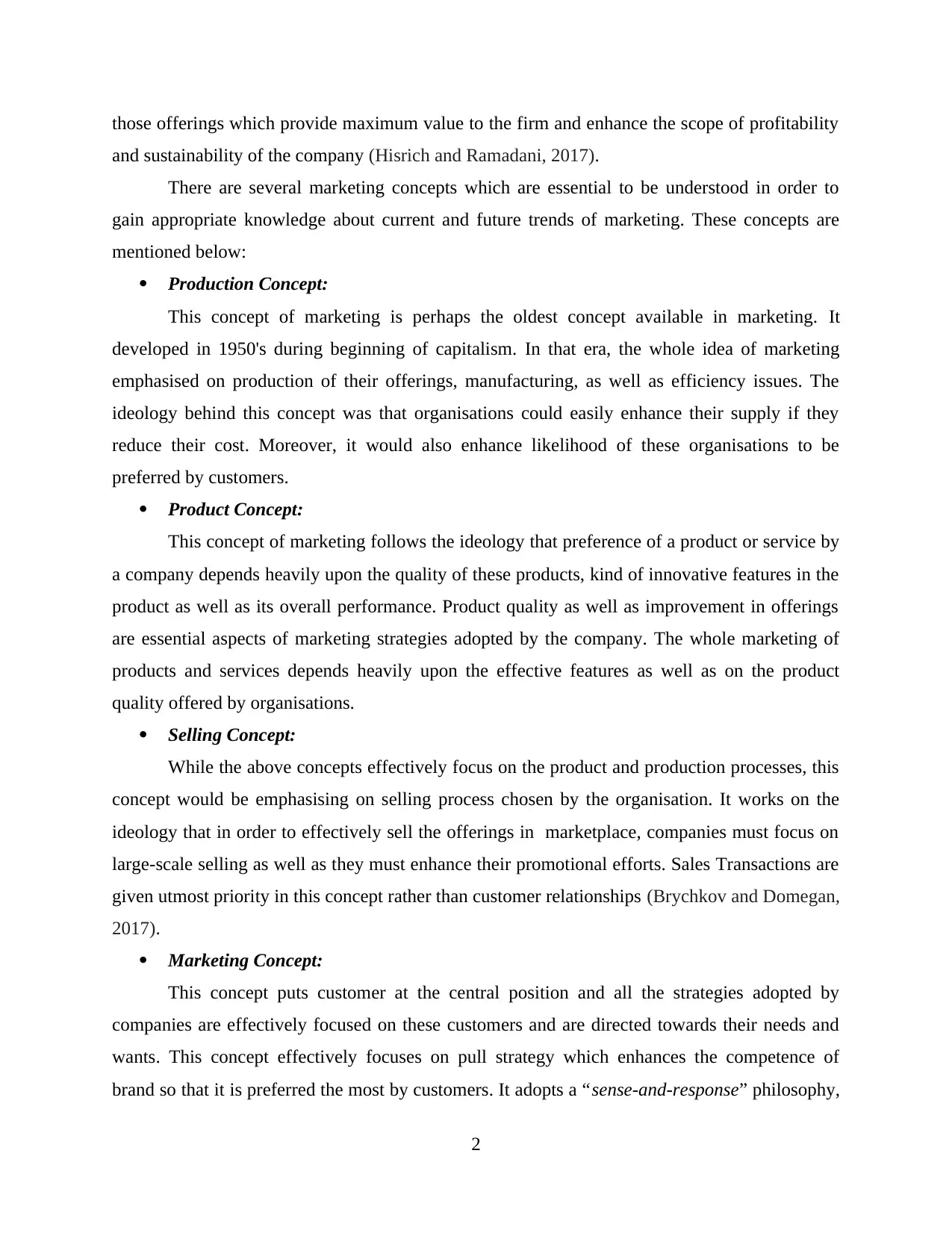
those offerings which provide maximum value to the firm and enhance the scope of profitability
and sustainability of the company (Hisrich and Ramadani, 2017).
There are several marketing concepts which are essential to be understood in order to
gain appropriate knowledge about current and future trends of marketing. These concepts are
mentioned below:
Production Concept:
This concept of marketing is perhaps the oldest concept available in marketing. It
developed in 1950's during beginning of capitalism. In that era, the whole idea of marketing
emphasised on production of their offerings, manufacturing, as well as efficiency issues. The
ideology behind this concept was that organisations could easily enhance their supply if they
reduce their cost. Moreover, it would also enhance likelihood of these organisations to be
preferred by customers.
Product Concept:
This concept of marketing follows the ideology that preference of a product or service by
a company depends heavily upon the quality of these products, kind of innovative features in the
product as well as its overall performance. Product quality as well as improvement in offerings
are essential aspects of marketing strategies adopted by the company. The whole marketing of
products and services depends heavily upon the effective features as well as on the product
quality offered by organisations.
Selling Concept:
While the above concepts effectively focus on the product and production processes, this
concept would be emphasising on selling process chosen by the organisation. It works on the
ideology that in order to effectively sell the offerings in marketplace, companies must focus on
large-scale selling as well as they must enhance their promotional efforts. Sales Transactions are
given utmost priority in this concept rather than customer relationships (Brychkov and Domegan,
2017).
Marketing Concept:
This concept puts customer at the central position and all the strategies adopted by
companies are effectively focused on these customers and are directed towards their needs and
wants. This concept effectively focuses on pull strategy which enhances the competence of
brand so that it is preferred the most by customers. It adopts a “sense-and-response” philosophy,
2
and sustainability of the company (Hisrich and Ramadani, 2017).
There are several marketing concepts which are essential to be understood in order to
gain appropriate knowledge about current and future trends of marketing. These concepts are
mentioned below:
Production Concept:
This concept of marketing is perhaps the oldest concept available in marketing. It
developed in 1950's during beginning of capitalism. In that era, the whole idea of marketing
emphasised on production of their offerings, manufacturing, as well as efficiency issues. The
ideology behind this concept was that organisations could easily enhance their supply if they
reduce their cost. Moreover, it would also enhance likelihood of these organisations to be
preferred by customers.
Product Concept:
This concept of marketing follows the ideology that preference of a product or service by
a company depends heavily upon the quality of these products, kind of innovative features in the
product as well as its overall performance. Product quality as well as improvement in offerings
are essential aspects of marketing strategies adopted by the company. The whole marketing of
products and services depends heavily upon the effective features as well as on the product
quality offered by organisations.
Selling Concept:
While the above concepts effectively focus on the product and production processes, this
concept would be emphasising on selling process chosen by the organisation. It works on the
ideology that in order to effectively sell the offerings in marketplace, companies must focus on
large-scale selling as well as they must enhance their promotional efforts. Sales Transactions are
given utmost priority in this concept rather than customer relationships (Brychkov and Domegan,
2017).
Marketing Concept:
This concept puts customer at the central position and all the strategies adopted by
companies are effectively focused on these customers and are directed towards their needs and
wants. This concept effectively focuses on pull strategy which enhances the competence of
brand so that it is preferred the most by customers. It adopts a “sense-and-response” philosophy,
2
Paraphrase This Document
Need a fresh take? Get an instant paraphrase of this document with our AI Paraphraser
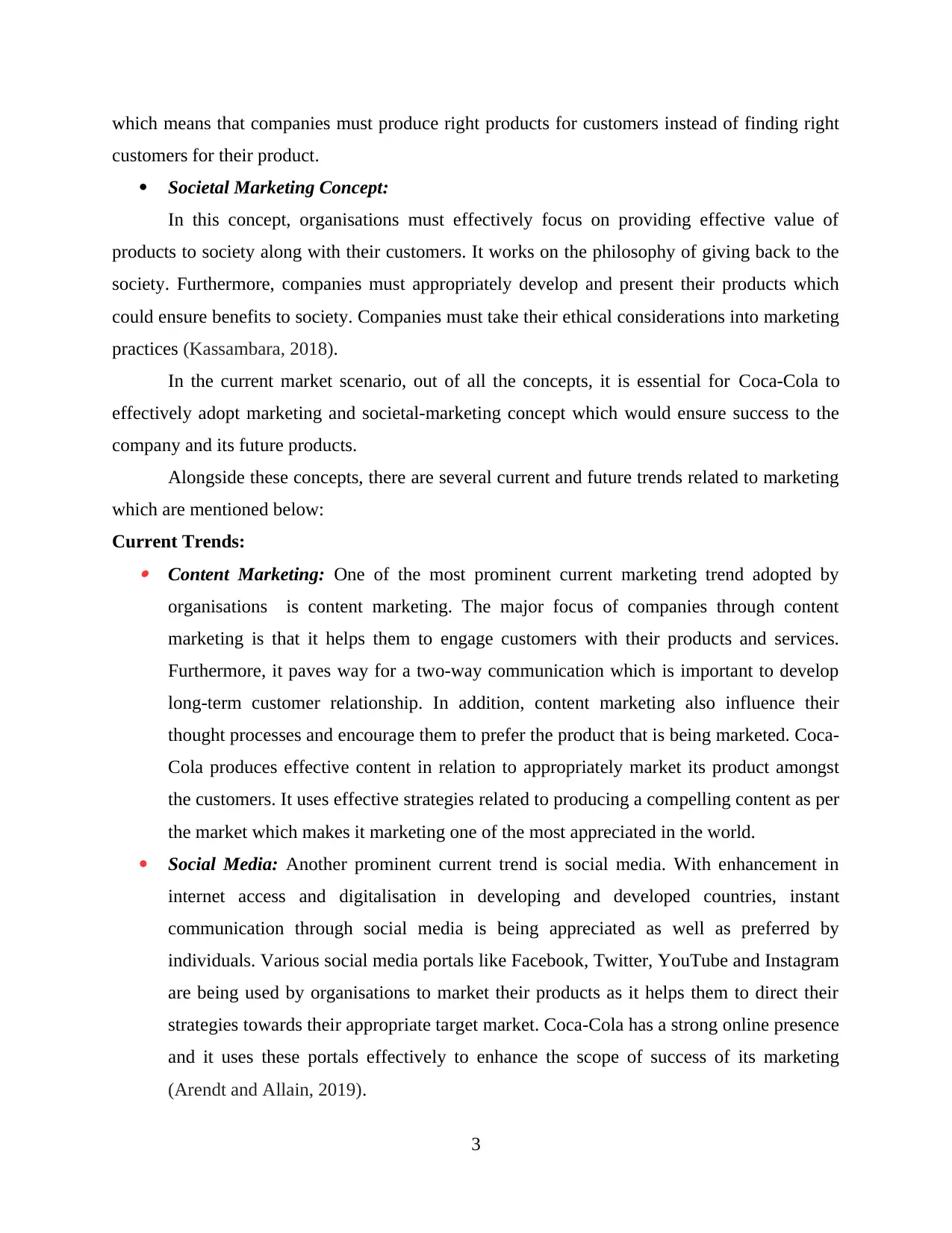
which means that companies must produce right products for customers instead of finding right
customers for their product.
Societal Marketing Concept:
In this concept, organisations must effectively focus on providing effective value of
products to society along with their customers. It works on the philosophy of giving back to the
society. Furthermore, companies must appropriately develop and present their products which
could ensure benefits to society. Companies must take their ethical considerations into marketing
practices (Kassambara, 2018).
In the current market scenario, out of all the concepts, it is essential for Coca-Cola to
effectively adopt marketing and societal-marketing concept which would ensure success to the
company and its future products.
Alongside these concepts, there are several current and future trends related to marketing
which are mentioned below:
Current Trends: Content Marketing: One of the most prominent current marketing trend adopted by
organisations is content marketing. The major focus of companies through content
marketing is that it helps them to engage customers with their products and services.
Furthermore, it paves way for a two-way communication which is important to develop
long-term customer relationship. In addition, content marketing also influence their
thought processes and encourage them to prefer the product that is being marketed. Coca-
Cola produces effective content in relation to appropriately market its product amongst
the customers. It uses effective strategies related to producing a compelling content as per
the market which makes it marketing one of the most appreciated in the world.
Social Media: Another prominent current trend is social media. With enhancement in
internet access and digitalisation in developing and developed countries, instant
communication through social media is being appreciated as well as preferred by
individuals. Various social media portals like Facebook, Twitter, YouTube and Instagram
are being used by organisations to market their products as it helps them to direct their
strategies towards their appropriate target market. Coca-Cola has a strong online presence
and it uses these portals effectively to enhance the scope of success of its marketing
(Arendt and Allain, 2019).
3
customers for their product.
Societal Marketing Concept:
In this concept, organisations must effectively focus on providing effective value of
products to society along with their customers. It works on the philosophy of giving back to the
society. Furthermore, companies must appropriately develop and present their products which
could ensure benefits to society. Companies must take their ethical considerations into marketing
practices (Kassambara, 2018).
In the current market scenario, out of all the concepts, it is essential for Coca-Cola to
effectively adopt marketing and societal-marketing concept which would ensure success to the
company and its future products.
Alongside these concepts, there are several current and future trends related to marketing
which are mentioned below:
Current Trends: Content Marketing: One of the most prominent current marketing trend adopted by
organisations is content marketing. The major focus of companies through content
marketing is that it helps them to engage customers with their products and services.
Furthermore, it paves way for a two-way communication which is important to develop
long-term customer relationship. In addition, content marketing also influence their
thought processes and encourage them to prefer the product that is being marketed. Coca-
Cola produces effective content in relation to appropriately market its product amongst
the customers. It uses effective strategies related to producing a compelling content as per
the market which makes it marketing one of the most appreciated in the world.
Social Media: Another prominent current trend is social media. With enhancement in
internet access and digitalisation in developing and developed countries, instant
communication through social media is being appreciated as well as preferred by
individuals. Various social media portals like Facebook, Twitter, YouTube and Instagram
are being used by organisations to market their products as it helps them to direct their
strategies towards their appropriate target market. Coca-Cola has a strong online presence
and it uses these portals effectively to enhance the scope of success of its marketing
(Arendt and Allain, 2019).
3
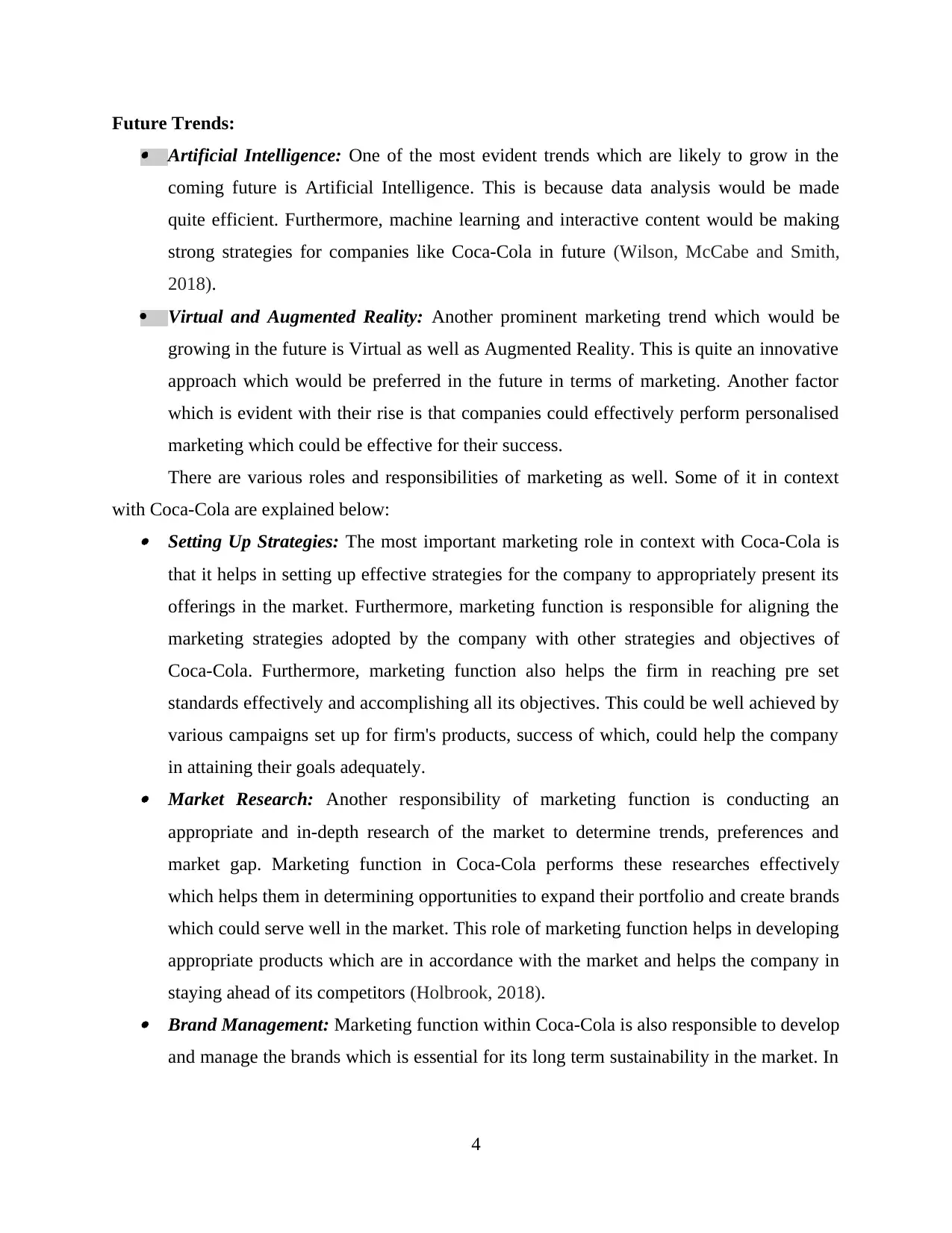
Future Trends: Artificial Intelligence: One of the most evident trends which are likely to grow in the
coming future is Artificial Intelligence. This is because data analysis would be made
quite efficient. Furthermore, machine learning and interactive content would be making
strong strategies for companies like Coca-Cola in future (Wilson, McCabe and Smith,
2018).
Virtual and Augmented Reality: Another prominent marketing trend which would be
growing in the future is Virtual as well as Augmented Reality. This is quite an innovative
approach which would be preferred in the future in terms of marketing. Another factor
which is evident with their rise is that companies could effectively perform personalised
marketing which could be effective for their success.
There are various roles and responsibilities of marketing as well. Some of it in context
with Coca-Cola are explained below: Setting Up Strategies: The most important marketing role in context with Coca-Cola is
that it helps in setting up effective strategies for the company to appropriately present its
offerings in the market. Furthermore, marketing function is responsible for aligning the
marketing strategies adopted by the company with other strategies and objectives of
Coca-Cola. Furthermore, marketing function also helps the firm in reaching pre set
standards effectively and accomplishing all its objectives. This could be well achieved by
various campaigns set up for firm's products, success of which, could help the company
in attaining their goals adequately. Market Research: Another responsibility of marketing function is conducting an
appropriate and in-depth research of the market to determine trends, preferences and
market gap. Marketing function in Coca-Cola performs these researches effectively
which helps them in determining opportunities to expand their portfolio and create brands
which could serve well in the market. This role of marketing function helps in developing
appropriate products which are in accordance with the market and helps the company in
staying ahead of its competitors (Holbrook, 2018). Brand Management: Marketing function within Coca-Cola is also responsible to develop
and manage the brands which is essential for its long term sustainability in the market. In
4
coming future is Artificial Intelligence. This is because data analysis would be made
quite efficient. Furthermore, machine learning and interactive content would be making
strong strategies for companies like Coca-Cola in future (Wilson, McCabe and Smith,
2018).
Virtual and Augmented Reality: Another prominent marketing trend which would be
growing in the future is Virtual as well as Augmented Reality. This is quite an innovative
approach which would be preferred in the future in terms of marketing. Another factor
which is evident with their rise is that companies could effectively perform personalised
marketing which could be effective for their success.
There are various roles and responsibilities of marketing as well. Some of it in context
with Coca-Cola are explained below: Setting Up Strategies: The most important marketing role in context with Coca-Cola is
that it helps in setting up effective strategies for the company to appropriately present its
offerings in the market. Furthermore, marketing function is responsible for aligning the
marketing strategies adopted by the company with other strategies and objectives of
Coca-Cola. Furthermore, marketing function also helps the firm in reaching pre set
standards effectively and accomplishing all its objectives. This could be well achieved by
various campaigns set up for firm's products, success of which, could help the company
in attaining their goals adequately. Market Research: Another responsibility of marketing function is conducting an
appropriate and in-depth research of the market to determine trends, preferences and
market gap. Marketing function in Coca-Cola performs these researches effectively
which helps them in determining opportunities to expand their portfolio and create brands
which could serve well in the market. This role of marketing function helps in developing
appropriate products which are in accordance with the market and helps the company in
staying ahead of its competitors (Holbrook, 2018). Brand Management: Marketing function within Coca-Cola is also responsible to develop
and manage the brands which is essential for its long term sustainability in the market. In
4
⊘ This is a preview!⊘
Do you want full access?
Subscribe today to unlock all pages.

Trusted by 1+ million students worldwide
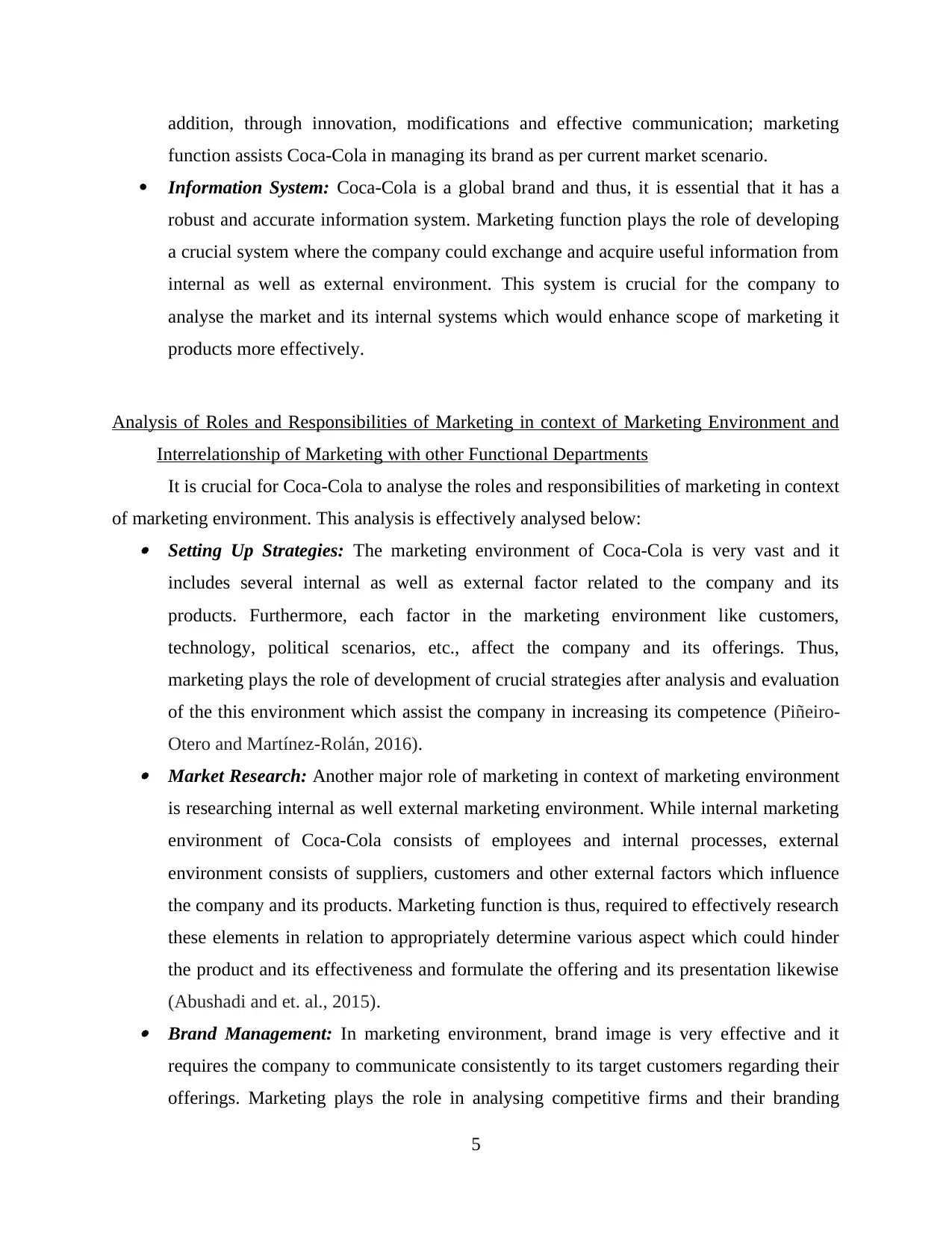
addition, through innovation, modifications and effective communication; marketing
function assists Coca-Cola in managing its brand as per current market scenario.
Information System: Coca-Cola is a global brand and thus, it is essential that it has a
robust and accurate information system. Marketing function plays the role of developing
a crucial system where the company could exchange and acquire useful information from
internal as well as external environment. This system is crucial for the company to
analyse the market and its internal systems which would enhance scope of marketing it
products more effectively.
Analysis of Roles and Responsibilities of Marketing in context of Marketing Environment and
Interrelationship of Marketing with other Functional Departments
It is crucial for Coca-Cola to analyse the roles and responsibilities of marketing in context
of marketing environment. This analysis is effectively analysed below: Setting Up Strategies: The marketing environment of Coca-Cola is very vast and it
includes several internal as well as external factor related to the company and its
products. Furthermore, each factor in the marketing environment like customers,
technology, political scenarios, etc., affect the company and its offerings. Thus,
marketing plays the role of development of crucial strategies after analysis and evaluation
of the this environment which assist the company in increasing its competence (Piñeiro-
Otero and Martínez-Rolán, 2016). Market Research: Another major role of marketing in context of marketing environment
is researching internal as well external marketing environment. While internal marketing
environment of Coca-Cola consists of employees and internal processes, external
environment consists of suppliers, customers and other external factors which influence
the company and its products. Marketing function is thus, required to effectively research
these elements in relation to appropriately determine various aspect which could hinder
the product and its effectiveness and formulate the offering and its presentation likewise
(Abushadi and et. al., 2015). Brand Management: In marketing environment, brand image is very effective and it
requires the company to communicate consistently to its target customers regarding their
offerings. Marketing plays the role in analysing competitive firms and their branding
5
function assists Coca-Cola in managing its brand as per current market scenario.
Information System: Coca-Cola is a global brand and thus, it is essential that it has a
robust and accurate information system. Marketing function plays the role of developing
a crucial system where the company could exchange and acquire useful information from
internal as well as external environment. This system is crucial for the company to
analyse the market and its internal systems which would enhance scope of marketing it
products more effectively.
Analysis of Roles and Responsibilities of Marketing in context of Marketing Environment and
Interrelationship of Marketing with other Functional Departments
It is crucial for Coca-Cola to analyse the roles and responsibilities of marketing in context
of marketing environment. This analysis is effectively analysed below: Setting Up Strategies: The marketing environment of Coca-Cola is very vast and it
includes several internal as well as external factor related to the company and its
products. Furthermore, each factor in the marketing environment like customers,
technology, political scenarios, etc., affect the company and its offerings. Thus,
marketing plays the role of development of crucial strategies after analysis and evaluation
of the this environment which assist the company in increasing its competence (Piñeiro-
Otero and Martínez-Rolán, 2016). Market Research: Another major role of marketing in context of marketing environment
is researching internal as well external marketing environment. While internal marketing
environment of Coca-Cola consists of employees and internal processes, external
environment consists of suppliers, customers and other external factors which influence
the company and its products. Marketing function is thus, required to effectively research
these elements in relation to appropriately determine various aspect which could hinder
the product and its effectiveness and formulate the offering and its presentation likewise
(Abushadi and et. al., 2015). Brand Management: In marketing environment, brand image is very effective and it
requires the company to communicate consistently to its target customers regarding their
offerings. Marketing plays the role in analysing competitive firms and their branding
5
Paraphrase This Document
Need a fresh take? Get an instant paraphrase of this document with our AI Paraphraser
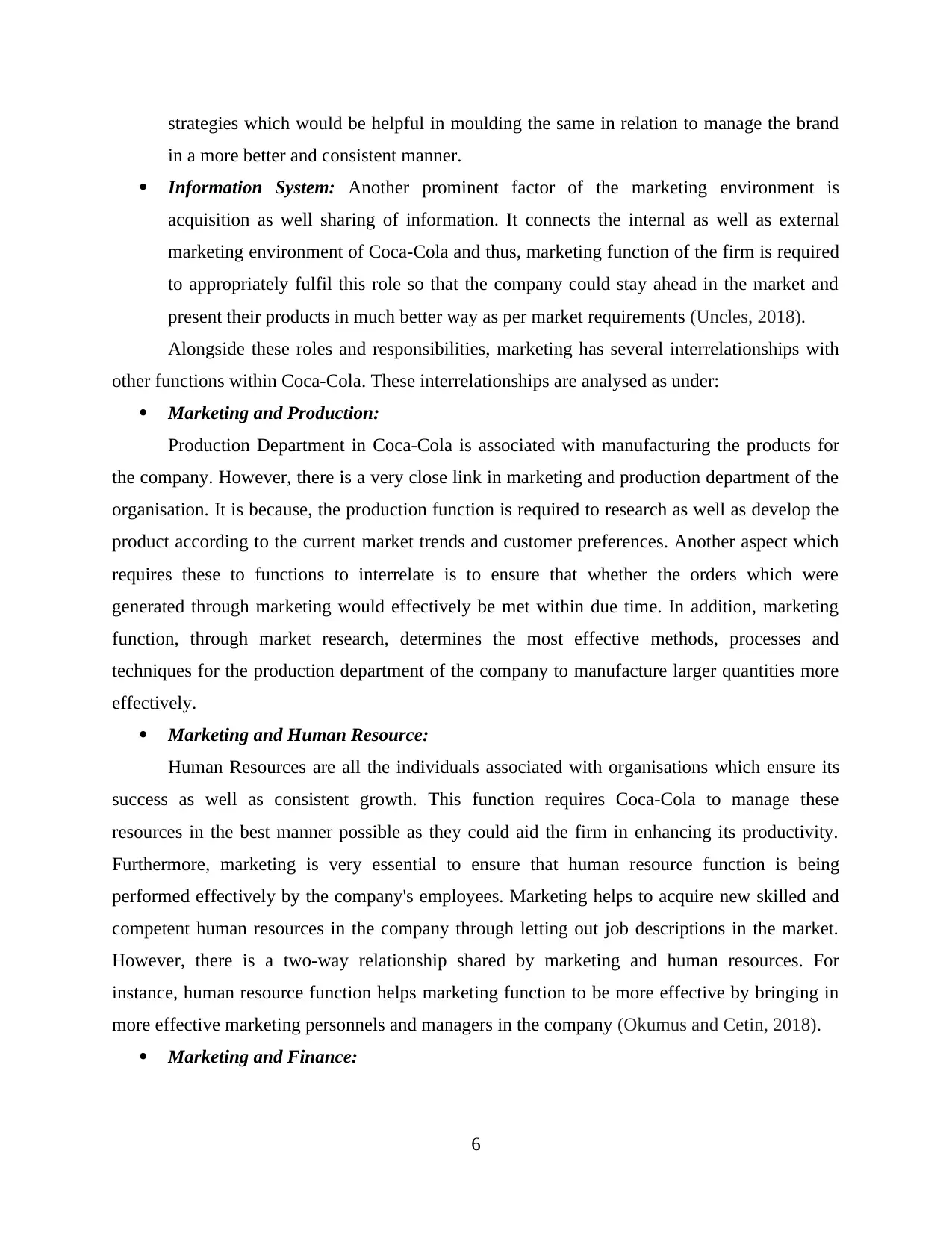
strategies which would be helpful in moulding the same in relation to manage the brand
in a more better and consistent manner.
Information System: Another prominent factor of the marketing environment is
acquisition as well sharing of information. It connects the internal as well as external
marketing environment of Coca-Cola and thus, marketing function of the firm is required
to appropriately fulfil this role so that the company could stay ahead in the market and
present their products in much better way as per market requirements (Uncles, 2018).
Alongside these roles and responsibilities, marketing has several interrelationships with
other functions within Coca-Cola. These interrelationships are analysed as under:
Marketing and Production:
Production Department in Coca-Cola is associated with manufacturing the products for
the company. However, there is a very close link in marketing and production department of the
organisation. It is because, the production function is required to research as well as develop the
product according to the current market trends and customer preferences. Another aspect which
requires these to functions to interrelate is to ensure that whether the orders which were
generated through marketing would effectively be met within due time. In addition, marketing
function, through market research, determines the most effective methods, processes and
techniques for the production department of the company to manufacture larger quantities more
effectively.
Marketing and Human Resource:
Human Resources are all the individuals associated with organisations which ensure its
success as well as consistent growth. This function requires Coca-Cola to manage these
resources in the best manner possible as they could aid the firm in enhancing its productivity.
Furthermore, marketing is very essential to ensure that human resource function is being
performed effectively by the company's employees. Marketing helps to acquire new skilled and
competent human resources in the company through letting out job descriptions in the market.
However, there is a two-way relationship shared by marketing and human resources. For
instance, human resource function helps marketing function to be more effective by bringing in
more effective marketing personnels and managers in the company (Okumus and Cetin, 2018).
Marketing and Finance:
6
in a more better and consistent manner.
Information System: Another prominent factor of the marketing environment is
acquisition as well sharing of information. It connects the internal as well as external
marketing environment of Coca-Cola and thus, marketing function of the firm is required
to appropriately fulfil this role so that the company could stay ahead in the market and
present their products in much better way as per market requirements (Uncles, 2018).
Alongside these roles and responsibilities, marketing has several interrelationships with
other functions within Coca-Cola. These interrelationships are analysed as under:
Marketing and Production:
Production Department in Coca-Cola is associated with manufacturing the products for
the company. However, there is a very close link in marketing and production department of the
organisation. It is because, the production function is required to research as well as develop the
product according to the current market trends and customer preferences. Another aspect which
requires these to functions to interrelate is to ensure that whether the orders which were
generated through marketing would effectively be met within due time. In addition, marketing
function, through market research, determines the most effective methods, processes and
techniques for the production department of the company to manufacture larger quantities more
effectively.
Marketing and Human Resource:
Human Resources are all the individuals associated with organisations which ensure its
success as well as consistent growth. This function requires Coca-Cola to manage these
resources in the best manner possible as they could aid the firm in enhancing its productivity.
Furthermore, marketing is very essential to ensure that human resource function is being
performed effectively by the company's employees. Marketing helps to acquire new skilled and
competent human resources in the company through letting out job descriptions in the market.
However, there is a two-way relationship shared by marketing and human resources. For
instance, human resource function helps marketing function to be more effective by bringing in
more effective marketing personnels and managers in the company (Okumus and Cetin, 2018).
Marketing and Finance:
6
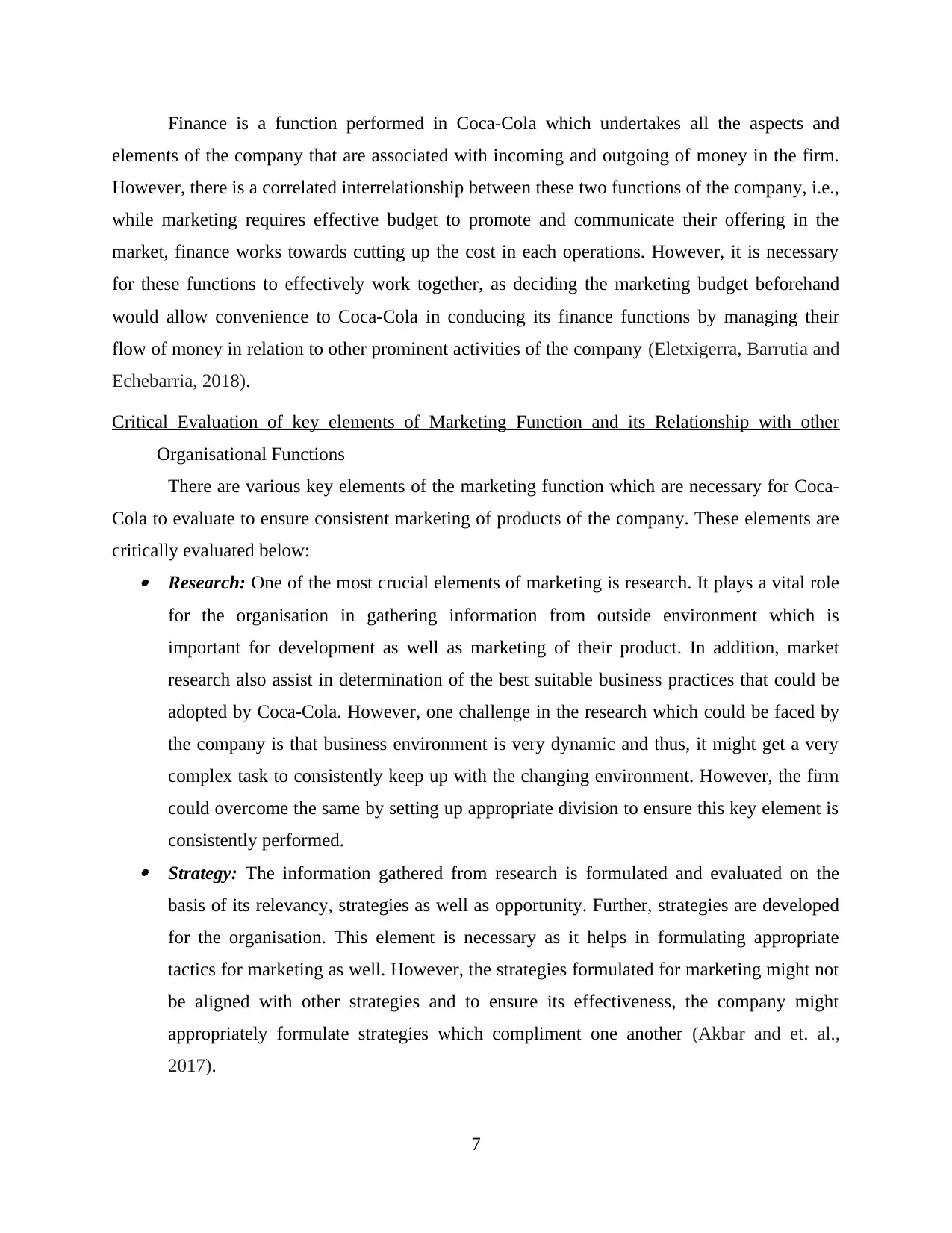
Finance is a function performed in Coca-Cola which undertakes all the aspects and
elements of the company that are associated with incoming and outgoing of money in the firm.
However, there is a correlated interrelationship between these two functions of the company, i.e.,
while marketing requires effective budget to promote and communicate their offering in the
market, finance works towards cutting up the cost in each operations. However, it is necessary
for these functions to effectively work together, as deciding the marketing budget beforehand
would allow convenience to Coca-Cola in conducing its finance functions by managing their
flow of money in relation to other prominent activities of the company (Eletxigerra, Barrutia and
Echebarria, 2018).
Critical Evaluation of key elements of Marketing Function and its Relationship with other
Organisational Functions
There are various key elements of the marketing function which are necessary for Coca-
Cola to evaluate to ensure consistent marketing of products of the company. These elements are
critically evaluated below: Research: One of the most crucial elements of marketing is research. It plays a vital role
for the organisation in gathering information from outside environment which is
important for development as well as marketing of their product. In addition, market
research also assist in determination of the best suitable business practices that could be
adopted by Coca-Cola. However, one challenge in the research which could be faced by
the company is that business environment is very dynamic and thus, it might get a very
complex task to consistently keep up with the changing environment. However, the firm
could overcome the same by setting up appropriate division to ensure this key element is
consistently performed. Strategy: The information gathered from research is formulated and evaluated on the
basis of its relevancy, strategies as well as opportunity. Further, strategies are developed
for the organisation. This element is necessary as it helps in formulating appropriate
tactics for marketing as well. However, the strategies formulated for marketing might not
be aligned with other strategies and to ensure its effectiveness, the company might
appropriately formulate strategies which compliment one another (Akbar and et. al.,
2017).
7
elements of the company that are associated with incoming and outgoing of money in the firm.
However, there is a correlated interrelationship between these two functions of the company, i.e.,
while marketing requires effective budget to promote and communicate their offering in the
market, finance works towards cutting up the cost in each operations. However, it is necessary
for these functions to effectively work together, as deciding the marketing budget beforehand
would allow convenience to Coca-Cola in conducing its finance functions by managing their
flow of money in relation to other prominent activities of the company (Eletxigerra, Barrutia and
Echebarria, 2018).
Critical Evaluation of key elements of Marketing Function and its Relationship with other
Organisational Functions
There are various key elements of the marketing function which are necessary for Coca-
Cola to evaluate to ensure consistent marketing of products of the company. These elements are
critically evaluated below: Research: One of the most crucial elements of marketing is research. It plays a vital role
for the organisation in gathering information from outside environment which is
important for development as well as marketing of their product. In addition, market
research also assist in determination of the best suitable business practices that could be
adopted by Coca-Cola. However, one challenge in the research which could be faced by
the company is that business environment is very dynamic and thus, it might get a very
complex task to consistently keep up with the changing environment. However, the firm
could overcome the same by setting up appropriate division to ensure this key element is
consistently performed. Strategy: The information gathered from research is formulated and evaluated on the
basis of its relevancy, strategies as well as opportunity. Further, strategies are developed
for the organisation. This element is necessary as it helps in formulating appropriate
tactics for marketing as well. However, the strategies formulated for marketing might not
be aligned with other strategies and to ensure its effectiveness, the company might
appropriately formulate strategies which compliment one another (Akbar and et. al.,
2017).
7
⊘ This is a preview!⊘
Do you want full access?
Subscribe today to unlock all pages.

Trusted by 1+ million students worldwide
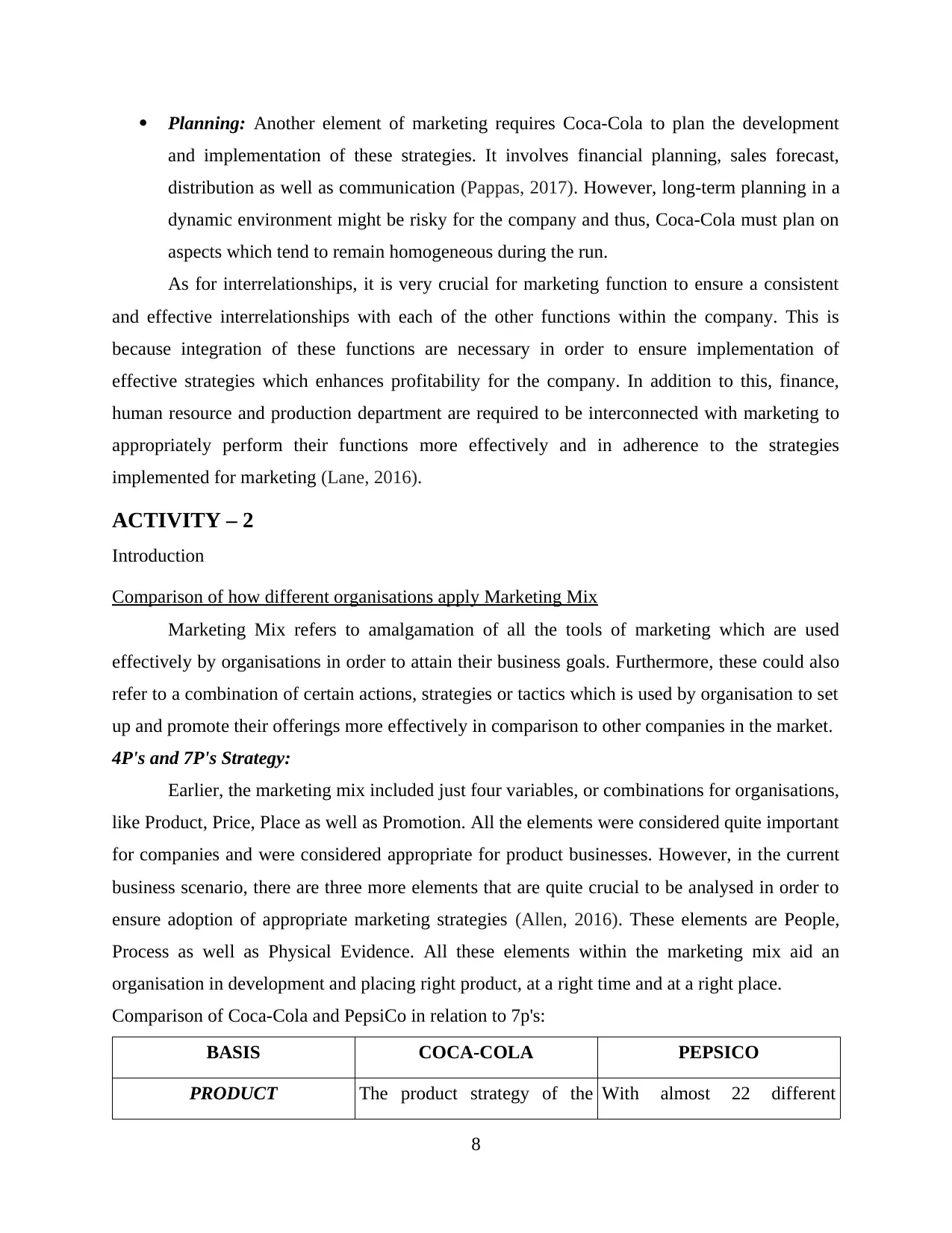
Planning: Another element of marketing requires Coca-Cola to plan the development
and implementation of these strategies. It involves financial planning, sales forecast,
distribution as well as communication (Pappas, 2017). However, long-term planning in a
dynamic environment might be risky for the company and thus, Coca-Cola must plan on
aspects which tend to remain homogeneous during the run.
As for interrelationships, it is very crucial for marketing function to ensure a consistent
and effective interrelationships with each of the other functions within the company. This is
because integration of these functions are necessary in order to ensure implementation of
effective strategies which enhances profitability for the company. In addition to this, finance,
human resource and production department are required to be interconnected with marketing to
appropriately perform their functions more effectively and in adherence to the strategies
implemented for marketing (Lane, 2016).
ACTIVITY – 2
Introduction
Comparison of how different organisations apply Marketing Mix
Marketing Mix refers to amalgamation of all the tools of marketing which are used
effectively by organisations in order to attain their business goals. Furthermore, these could also
refer to a combination of certain actions, strategies or tactics which is used by organisation to set
up and promote their offerings more effectively in comparison to other companies in the market.
4P's and 7P's Strategy:
Earlier, the marketing mix included just four variables, or combinations for organisations,
like Product, Price, Place as well as Promotion. All the elements were considered quite important
for companies and were considered appropriate for product businesses. However, in the current
business scenario, there are three more elements that are quite crucial to be analysed in order to
ensure adoption of appropriate marketing strategies (Allen, 2016). These elements are People,
Process as well as Physical Evidence. All these elements within the marketing mix aid an
organisation in development and placing right product, at a right time and at a right place.
Comparison of Coca-Cola and PepsiCo in relation to 7p's:
BASIS COCA-COLA PEPSICO
PRODUCT The product strategy of the With almost 22 different
8
and implementation of these strategies. It involves financial planning, sales forecast,
distribution as well as communication (Pappas, 2017). However, long-term planning in a
dynamic environment might be risky for the company and thus, Coca-Cola must plan on
aspects which tend to remain homogeneous during the run.
As for interrelationships, it is very crucial for marketing function to ensure a consistent
and effective interrelationships with each of the other functions within the company. This is
because integration of these functions are necessary in order to ensure implementation of
effective strategies which enhances profitability for the company. In addition to this, finance,
human resource and production department are required to be interconnected with marketing to
appropriately perform their functions more effectively and in adherence to the strategies
implemented for marketing (Lane, 2016).
ACTIVITY – 2
Introduction
Comparison of how different organisations apply Marketing Mix
Marketing Mix refers to amalgamation of all the tools of marketing which are used
effectively by organisations in order to attain their business goals. Furthermore, these could also
refer to a combination of certain actions, strategies or tactics which is used by organisation to set
up and promote their offerings more effectively in comparison to other companies in the market.
4P's and 7P's Strategy:
Earlier, the marketing mix included just four variables, or combinations for organisations,
like Product, Price, Place as well as Promotion. All the elements were considered quite important
for companies and were considered appropriate for product businesses. However, in the current
business scenario, there are three more elements that are quite crucial to be analysed in order to
ensure adoption of appropriate marketing strategies (Allen, 2016). These elements are People,
Process as well as Physical Evidence. All these elements within the marketing mix aid an
organisation in development and placing right product, at a right time and at a right place.
Comparison of Coca-Cola and PepsiCo in relation to 7p's:
BASIS COCA-COLA PEPSICO
PRODUCT The product strategy of the With almost 22 different
8
Paraphrase This Document
Need a fresh take? Get an instant paraphrase of this document with our AI Paraphraser
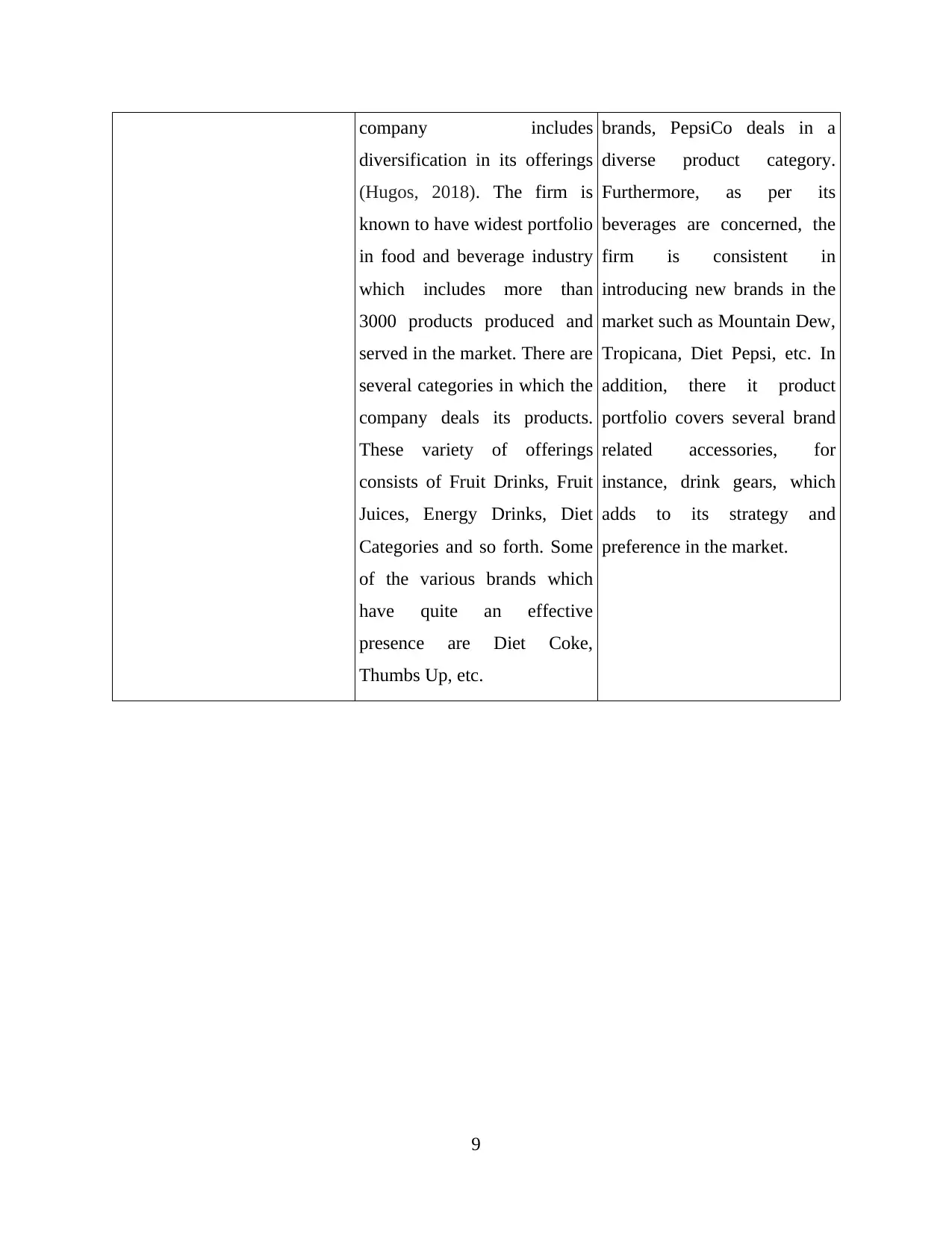
company includes
diversification in its offerings
(Hugos, 2018). The firm is
known to have widest portfolio
in food and beverage industry
which includes more than
3000 products produced and
served in the market. There are
several categories in which the
company deals its products.
These variety of offerings
consists of Fruit Drinks, Fruit
Juices, Energy Drinks, Diet
Categories and so forth. Some
of the various brands which
have quite an effective
presence are Diet Coke,
Thumbs Up, etc.
brands, PepsiCo deals in a
diverse product category.
Furthermore, as per its
beverages are concerned, the
firm is consistent in
introducing new brands in the
market such as Mountain Dew,
Tropicana, Diet Pepsi, etc. In
addition, there it product
portfolio covers several brand
related accessories, for
instance, drink gears, which
adds to its strategy and
preference in the market.
9
diversification in its offerings
(Hugos, 2018). The firm is
known to have widest portfolio
in food and beverage industry
which includes more than
3000 products produced and
served in the market. There are
several categories in which the
company deals its products.
These variety of offerings
consists of Fruit Drinks, Fruit
Juices, Energy Drinks, Diet
Categories and so forth. Some
of the various brands which
have quite an effective
presence are Diet Coke,
Thumbs Up, etc.
brands, PepsiCo deals in a
diverse product category.
Furthermore, as per its
beverages are concerned, the
firm is consistent in
introducing new brands in the
market such as Mountain Dew,
Tropicana, Diet Pepsi, etc. In
addition, there it product
portfolio covers several brand
related accessories, for
instance, drink gears, which
adds to its strategy and
preference in the market.
9
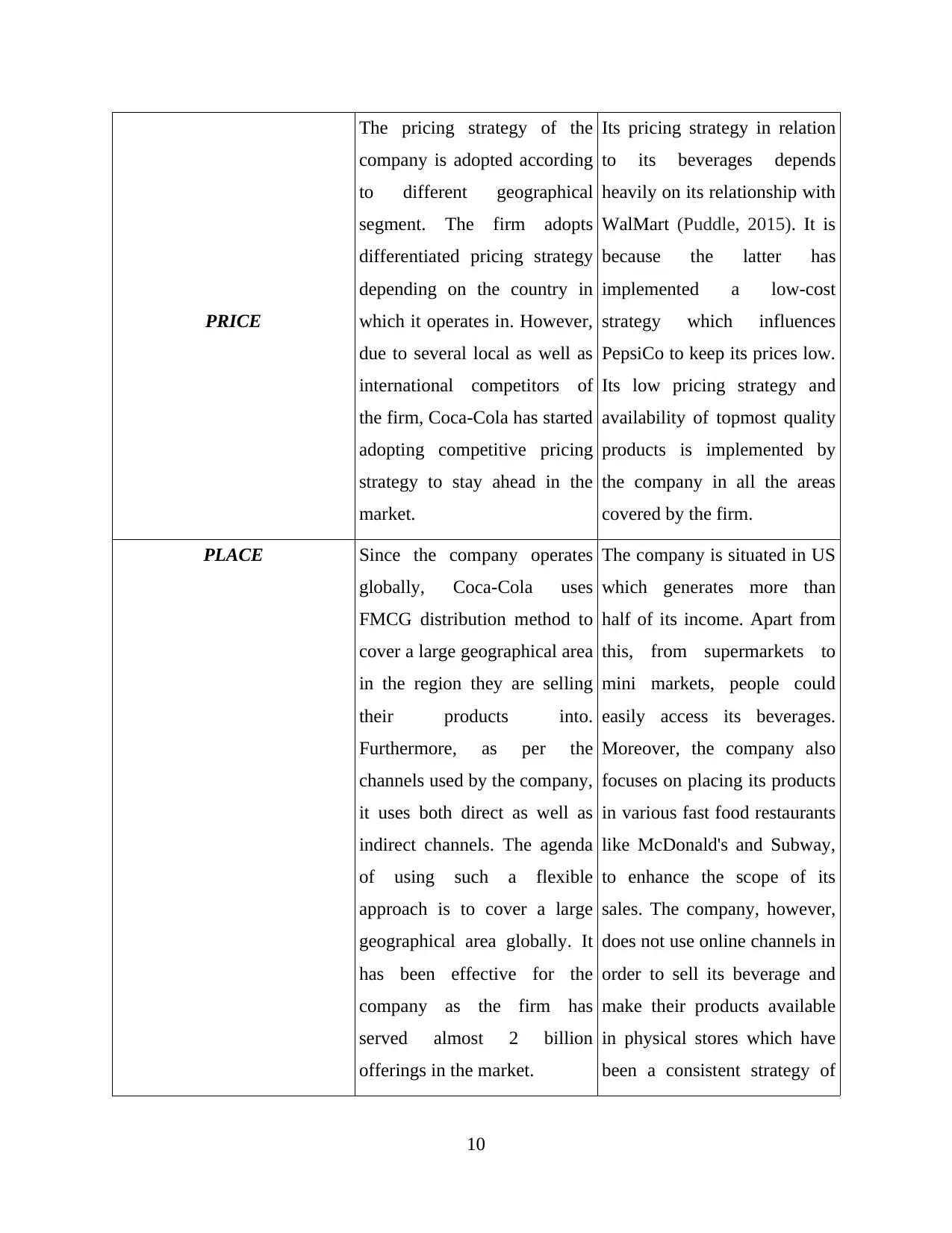
PRICE
The pricing strategy of the
company is adopted according
to different geographical
segment. The firm adopts
differentiated pricing strategy
depending on the country in
which it operates in. However,
due to several local as well as
international competitors of
the firm, Coca-Cola has started
adopting competitive pricing
strategy to stay ahead in the
market.
Its pricing strategy in relation
to its beverages depends
heavily on its relationship with
WalMart (Puddle, 2015). It is
because the latter has
implemented a low-cost
strategy which influences
PepsiCo to keep its prices low.
Its low pricing strategy and
availability of topmost quality
products is implemented by
the company in all the areas
covered by the firm.
PLACE Since the company operates
globally, Coca-Cola uses
FMCG distribution method to
cover a large geographical area
in the region they are selling
their products into.
Furthermore, as per the
channels used by the company,
it uses both direct as well as
indirect channels. The agenda
of using such a flexible
approach is to cover a large
geographical area globally. It
has been effective for the
company as the firm has
served almost 2 billion
offerings in the market.
The company is situated in US
which generates more than
half of its income. Apart from
this, from supermarkets to
mini markets, people could
easily access its beverages.
Moreover, the company also
focuses on placing its products
in various fast food restaurants
like McDonald's and Subway,
to enhance the scope of its
sales. The company, however,
does not use online channels in
order to sell its beverage and
make their products available
in physical stores which have
been a consistent strategy of
10
The pricing strategy of the
company is adopted according
to different geographical
segment. The firm adopts
differentiated pricing strategy
depending on the country in
which it operates in. However,
due to several local as well as
international competitors of
the firm, Coca-Cola has started
adopting competitive pricing
strategy to stay ahead in the
market.
Its pricing strategy in relation
to its beverages depends
heavily on its relationship with
WalMart (Puddle, 2015). It is
because the latter has
implemented a low-cost
strategy which influences
PepsiCo to keep its prices low.
Its low pricing strategy and
availability of topmost quality
products is implemented by
the company in all the areas
covered by the firm.
PLACE Since the company operates
globally, Coca-Cola uses
FMCG distribution method to
cover a large geographical area
in the region they are selling
their products into.
Furthermore, as per the
channels used by the company,
it uses both direct as well as
indirect channels. The agenda
of using such a flexible
approach is to cover a large
geographical area globally. It
has been effective for the
company as the firm has
served almost 2 billion
offerings in the market.
The company is situated in US
which generates more than
half of its income. Apart from
this, from supermarkets to
mini markets, people could
easily access its beverages.
Moreover, the company also
focuses on placing its products
in various fast food restaurants
like McDonald's and Subway,
to enhance the scope of its
sales. The company, however,
does not use online channels in
order to sell its beverage and
make their products available
in physical stores which have
been a consistent strategy of
10
⊘ This is a preview!⊘
Do you want full access?
Subscribe today to unlock all pages.

Trusted by 1+ million students worldwide
1 out of 21
Related Documents
Your All-in-One AI-Powered Toolkit for Academic Success.
+13062052269
info@desklib.com
Available 24*7 on WhatsApp / Email
![[object Object]](/_next/static/media/star-bottom.7253800d.svg)
Unlock your academic potential
Copyright © 2020–2025 A2Z Services. All Rights Reserved. Developed and managed by ZUCOL.




